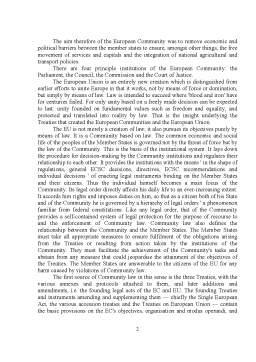Extras din referat
Until shortly after the end of the Second World War our concept of the State and our political life had developed almost entirely on the basis of national constitutions and laws. It was on this basis in our democratic States that the rules of conduct binding not only on citizens and parties but also on the State and its organs were created. It took the complete collapse of Europe and its political and economic decline to create the conditions for and give a new impetus to the idea of a new European order.
The foundation stone of a European Community was laid by the then French Foreign Minister, Robert Schuman, in his declaration of 9 May 1950, in which he put forward the plan he had worked out with Jean Monnet to pool Europe's coal and steel industries. This would, he declared, constitute a historic initiative for an 'organised and vital Europe', which was 'indispensable for civilisation' and without which the 'peace of the world could not be maintained'. The 'Schumann Plan' finally became a reality with the conclusion of the founding Treaty of the European Coal and Steel Community (ECSC) by the six founding States (Belgium, Germany, France, Italy, Luxembourg and the Netherlands) on 18 April 1951 in Paris (Treaty of Paris) and its entry into force on 23 July 1952. A further development came some years later with the Treaties of Rome of 25 March 1957, which created the European Economic Community (EEC) and the European Atomic Energy Community (Euratom); these began their work when the Treaties entered into force on 1 January 1958. By the passing of the European Community Act 1972 the United Kingdom became a member of the European Economic Community.
The aim therefore of the European Community was to remove economic and political barriers between the member states to ensure, amongst other things, the free movement of services and capitals and the integration of national agricultural and transport policies.
There are four principle institutions of the European Community: the Parliament, the Council, the Commission and the Court of Justice.
The European Union is an entirely new creation which is distinguished from earlier efforts to unite Europe in that it works, not by means of force or domination, but simply by means of law. Law is intended to succeed where 'blood and iron' have for centuries failed. For only unity based on a freely made decision can be expected to last: unity founded on fundamental values such as freedom and equality, and protected and translated into reality by law. That is the insight underlying the Treaties that created the European Communities and the European Union.
The EU is not merely a creation of law; it also pursues its objectives purely by means of law. It is a Community based on law. The common economic and social life of the peoples of the Member States is governed not by the threat of force but by the law of the Community. This is the basis of the institutional system. It lays down the procedure for decision-making by the Community institutions and regulates their relationship to each other. It provides the institutions with the means ' in the shape of regulations, general ECSC decisions, directives, ECSC recommendations and individual decisions ' of enacting legal instruments binding on the Member States and their citizens. Thus the individual himself becomes a main focus of the Community. Its legal order directly affects his daily life to an ever-increasing extent. It accords him rights and imposes duties on him, so that as a citizen both of his State and of the Community he is governed by a hierarchy of legal orders ' a phenomenon familiar from federal constitutions. Like any legal order, that of the Community provides a self-contained system of legal protection for the purpose of recourse to and the enforcement of Community law. Community law also defines the relationship between the Community and the Member States. The Member States must take all appropriate measures to ensure fulfilment of the obligations arising from the Treaties or resulting from action taken by the institutions of the Community. They must facilitate the achievement of the Community's tasks and abstain from any measure that could jeopardise the attainment of the objectives of the Treaties. The Member States are answerable to the citizens of the EU for any harm caused by violations of Community law.
The first source of Community law in this sense is the three Treaties, with the various annexes and protocols attached to them, and later additions and amendments, i.e. the founding legal acts of the EC and EU. The founding Treaties and instruments amending and supplementing them — chiefly the Single European Act, the various accession treaties and the Treaties on European Union — contain the basic provisions on the EC's objectives, organisation and modus operandi, and the bulk of its economic law. They thus set the constitutional framework for the life of the EC, which is then fleshed out in the Community interest by legislative and administrative action by the Community institutions. The Treaties, being legal instruments created directly by the Member States, are known in legal circles as primary legislation.
Law made by the Community institutions in exercising the powers conferred on them by the Treaties is referred to as secondary legislation, the second great source of Community law.
Preview document
Conținut arhivă zip
- Community Law.doc


















